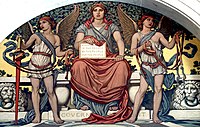
Photo from wikipedia
Abstract Hotel scores are critical indicators of satisfaction. However, the diversity of methodologies for calculating these indicators leads to notable differences. To explore such discrepancies, this study investigated the differences… Click to show full abstract
Abstract Hotel scores are critical indicators of satisfaction. However, the diversity of methodologies for calculating these indicators leads to notable differences. To explore such discrepancies, this study investigated the differences when monetary and non-monetary components are included in the measures of satisfaction. The empirical test conducted on over 26,000 hotels revealed that exclusively using non-monetary components in satisfaction measures (e.g., arithmetic mean of non-monetary attributes) leads to higher values than using monetary measures of satisfaction (e.g., value for money). The deviations between attribute performance and its expected value explained the difference between both satisfaction measures. In addition, the attributes to which people seem to be monetarily sensitive are “comfort,” “staff,” and “services.” This study provides a tool for decision-makers to identify the best method for communicating the hotel’s satisfaction measures via its position in the market and attributes that require reinforcement.
Journal Title: International Journal of Hospitality Management
Year Published: 2020
Link to full text (if available)
Share on Social Media: Sign Up to like & get
recommendations!